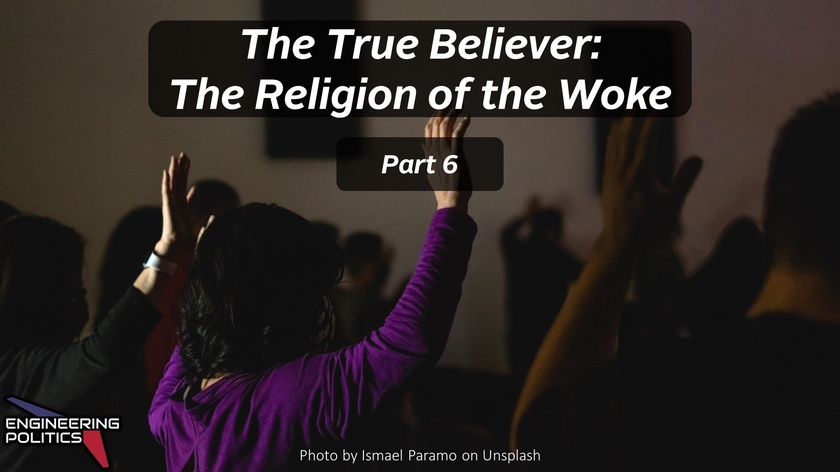
We have reached the final part of Hoffer’s amazing book. If you want my main takeaway from reading this book, it is that it was way too short. The truth bombs kept hitting and I did not want it to end, but we are here now. Part 4: Beginning and End wraps up this masterpiece by explaining the lifecycle of the modern mass movement.
Hoffer begins this final part with a section titled Men of Words. Hoffer writes:
“Mass movements do not usually rise until the prevailing order has been discredited. The discrediting is not an automatic result of the blunders and abuses of those in power, but the deliberate work of men of words with a grievance… On the other hand, a dispensation of undoubted merit and vigor may be swept away if it fails to win the allegiance of the articulate minority.”
When I think of ‘men of words’ giving rise to a mass movement, I think of Martin Luther King Jr. He is an example of a greatly positive mass movement that took a passionate man representing a real grievance to create social and political change. He was undoubtedly the head of a massive civil rights movement until his untimely death in 1968, but the fight for civil rights did not end with him. It has continued with the representation of many civil rights leaders and different causes to stand up for. The woke, and the people who support them, consider themselves part of this movement. But do they have a valid connection to the same civil rights movement MLK stood up for? I would argue ‘no’ and Hoffer lays out a good reason why. He continues:
“The reason for the tragic fate which almost always overtakes the intellectual midwives of a mass movement is that, no matter how much they preach and glorify the united effort, they remain essentially individualists. They believe in the possibility of individual happiness and the validity of individual opinion and initiative. But once a movement gets rolling, power falls into the hands of those who have neither faith in, nor respect for, the individual. And the reason they prevail is not so much that their disregard of the individual gives them a capacity for ruthlessness, but that their attitude is in full accord with the ruling passion of the masses.”
MLK was popular because of his individual capacity to speak affluently and effectively. We build statues of him, name schools and streets after him, and celebrate his memory because of what he did and what he stood for. The civil rights movement has moved on from not only the man but also the teachings of MLK. In fact, I can only imagine MLK would be horrified if he saw what people call “civil rights” today. In MLK’s I Have A Dream speech, he said, “I look to a day when people will not be judged by the color of their skin, but by the content of their character.” Civil rights today, which is now in the firm control of the woke, completely denies and actively reverses that dream. Content of character is being exchanged for skin color in academia, media, government, and private business by the demand of the woke mob. They are the ruling masses now because individualism has been completely ejected out of the movement. The current-day civil rights movement is completely unrecognizable when compared to the civil rights movement led by MLK.
Hoffer then moves on to talk about The Fanatics role in starting a mass movement. Hoffer refers to fanatics several times throughout the book because they are essential to the lifeblood of the movement – beginning to end. Hoffer writes:
“When the moment is ripe, only the fanatic can hatch a genuine mass movement… Without him there can perhaps be no new beginning.”
Enthusiasm and belief are essential to the beginning of a mass movement and the fanatic supplies both in bulk. Even a great man of words, like MLK, does not jumpstart a movement like a fanatic, like Malcolm X. But even fanatics with much less creativity and influence than someone like Malcolm X can help start a mass movement. Hoffer continues:
“He justifies his will to anarchy with the plausible assertion that there can be no new beginning so long as the old clutters the landscape… When the struggle with the old order is bitter and chaotic and victory can be won only by utmost unity and self-sacrifice, the creative man of words is usually shoved aside and the management of the affairs falls into the hands of the noncreative men of words – the eternal misfits and the fanatical contemners of the present.”
When the woke took over the civil rights movement their ideas were not always coherent or convincing. This is where the fanatic steps in to blow up all understanding of the present in the attempt to force bad ideas to stick. This is how mathematics, the nuclear family, and personal responsibility start to be labeled “white supremacist ideas.” Any understanding or idea of today that acts as an obstacle to the utopia promised by the movement is dismantled by the fanatic. They write books, teach college courses, and hold seminars for large corporations to push regressive ideas meant to create a new landscape of chaos and hatred. And the kicker is they are not even very creative in their attempts to indoctrinate others. I read Ibram X. Kendi’s book How To Be An Antiracist and his inability to string together a coherent thought along with his ability to write contradictions every other sentence was not creative or compelling. The only purpose it served was to convince other fanatics that there is a holy cause worth fighting for. This results in a mass movement solely driven by fanaticism instead of ideas, and that can only end in disaster – as Hoffer continues to explain:
“The danger of the fanatic to the development of a movement is that he cannot settle down. Once victory has been won and the new order begins to crystallize, the fanatic becomes an element of strain and disruption. The taste for strong feeling drives him on to search for mysteries yet to be revealed and secret doors yet to be opened. He keeps groping for extremes. Thus on the morrow of victory most mass movement find themselves in the grip of dissension… Hatred has become a habit. With no more enemies to destroy, the fanatics make enemies of one another.”
As I have said in previous reviews, no one wants to step up and lead this woke movement because they are prone to eating their own. The extremes keep moving so no one at the top is ever extreme enough for long enough. What started with calls for police reform – which is a demand for a change in police practices – is now at defunding the police – which demands the end of policing (and now moving towards the end of incarceration as well). What started with racial equality – which is a call for equal treatment – has now moved to racial equity – which is a phrase straight out of an Orwell novel demanding equal outcomes. What started with gay rights – which demands the equal treatment of homosexuals – has moved to full LGBTQ+ activism – which demands we pretend there is no such thing as biological sex (and is moving towards demanding child abuse). There are a ton more examples of this extreme radicalism that is now mainstream because people are too scared to stand up to the fanatics. Now, I will admit, it is fun watching them destroy each other sometimes, but we cannot afford to wait to the point where all they have left is to destroy each other.
Hoffer then moves to the role of Practical Men of Action and the end of the mass movement. Hoffer writes:
“A movement is pioneered by men of words, materialized by fanatics and consolidated by men of action… The man of action saves the movement from the suicidal dissensions and recklessness of the fanatics. But his appearance usually marks the end of the dynamic phase of the movement.”
The practical man of action acts as the voice of reason for the mass movement. This marks the end of the lifecycle for the movement, but, unfortunately, there are no practical men of action to be found today within the woke movement. Hoffer expands on the role of the man of action:
“In the hands of a man of action the mass movement ceases to be a refuge from the agonies and burdens of an individual existence and becomes a means of self-realization for the ambitious.”
Maybe we need to wait it out until someone within the movement steps up and fills that role, but considering the parasitic nature of wokeism, I am not sure that day will ever come. The principles of wokeism have been around for a long time – going all the way back to Rousseau, Kant, Hegel, Engels, and Marx through to modern-day post-modernists of the late 20th century – and the church they built might be around for a long time. Unfortunately, we may have to live with the religion of wokeism for a while, but we need to do our best to expose their bad ideas and reduce their influence.
Hoffer makes his closing remarks on mass movements in his final section titled Good and Bad Mass Movements. This is split up into three different subsections starting with The Unattractiveness and Sterility of the Active Phase. Hoffer writes:
“This book concerns itself chiefly with the active phase of mass movements – the phase molded and dominated by the true believer… Whenever we find a period of genuine creativeness associated with a mass movement, it is almost always a period which either precedes or, more often, follows the active phase.”
There is no doubt that some mass movements are more to certain people than others. Wokeism is attractive to the idealistic youth, the progressive ideolog, and the creative types with no good outlet for their creativity (along with several other groups covered in Part 2 of my reviews). The counterintuitive observation one might make here is that wokeism distains creativity – that is any creativity not pushing their pre-approved narrative. They call out actors acting in roles of people of different identities. They censor books that do not tell the stories they approve of. They praise ‘musicians’ (using that term loosely here) who create porn parodies of dance music while vilifying music by people who do not stand up for the right causes – meaning any cause other than theirs. Genuine creativity to dead, or asleep, while the woke are in positions of power and influence.
The next subsection Hoffer covers is Some Factors Which Determine the Length of the Active Phase. Hoffer writes:
“A mass movement with a concrete, limited objective is likely to have a short active phase than a movement with a nebulous, indefinite objective.”
Beware of any group that seems purposefully underdefined. Ambiguity is intentional in most instances. For example, the word racism can mean many different things depending on the intended context. It can hold its traditional definition: Prejudice based on race. And then there is the woke definition as defined by Ibram X. Kendi: Supporting a racist policy through actions or inaction or expressing a racist idea. You may have noticed after reading both these definitions that the first one is clear and concise, and the second one provided by Kendi not only lacks anything that could be considered a definition but he also uses the word to define itself (he uses ‘racist’ twice in the definition of ‘racism’). This creates circular logic which leaves the interpretation of the word up to the user. Racism, in Kendi’s context, can mean or refer to literally anything. This error was not made due to stupidity, but it was made for the sake of ambiguity. This was a purposeful move by the woke using something George Orwell calls doublespeak (from his book 1894). Doublespeak is when a word has multiple meanings used at the same time. The word ‘racism’ can mean anything – such as saying racial disparities are racist because they have inequal outcomes – and when someone claims the label is being misapplied, they are called out as racist using the traditional definition. And this is just one of many ways the woke use ambiguity to create chaos.
Hoffer ends with a subsection covering Useful Mass Movements. Hoffer finishes the book by writing:
“It is probably better for a country that when its government begins to show signs of chronic incompetence it should be overthrown by a mighty mass movement – even though such overthrow involves a considerable waste of life and wealth – than that it should be allowed to fall and crumble of itself. A genuine popular upheaval is often an invigorating, renovating and integrating process.”
It is true, mass movements are necessary for many different cases. An inept government is much like being bored at work – you cannot focus on what you should be doing, and you will not provide any productive value to your employer. Now imagine your focus should be on protecting human rights and your employer is the American people. I cited this quote in an earlier review (Part 2), but it is worth repeating what I once heard Dr. Jordan Peterson say, “boredom is caused by an excess of order.” You break an excess of order by injecting a little chaos into the mix. That is what a mass movement does – creates a little chaos. Chaos is not inherently a bad thing, when balances with order, but you want to make sure it is the right kind of chaos.
There is no doubt that the United States government is showing signs of chronic incompetence. All sides agree with that. Chaos caused by a mass movement seems to be a good solution, but is wokeism the right kind of chaos? I hope by now I have convinced you the answer is “no.” If I have not convinced you, read Hoffer’s The True Believer yourself and ask yourself the question again. If the answer is still not an emphatic “no,” move out of your mother’s basement, take off your black facemask, put down your copy of A People’s History by Howard Zinn, and take some responsibility for your life and see how it feels. If you do not think you can do that, do as the great Don Corleone said in The Godfather, “You can act like a man!” (If you do not like my toxic masculinity, do as the great Stanley Hudson says in The Office, “Just write a petition, get everyone's signature, including our clients, march down to Florida, and shove it up your butt!”)
Thank you for reading! I will have an additional part covering a few more thoughts on this subject coming soon. Also, I plan on releasing these in the Engineering Politics Locals Community a week or so before I republish them on Medium. This way the members of this community get to see it first. I really appreciate your support because this type of content takes some time and a lot of thought to produce. I will also do a podcast covering this material shortly after it is completed. Thanks again!

I was listening to some news updates when I heard this CNN clip about the potentially hazardous water in East Palestine, and as soon as I heard her ask the question about whether or not her guest would drink the water, I IMMEDIATELY thought of this clip from South Park. Enjoy.
In this special episode of The Engineering Politics Podcast, Truman from Return To Reason is back for a new video and podcast series titled ‘Revisiting The Road To Serfdom’ where we review F.A. Hayek’s classic work, The Road To Serfdom. This episode covers ‘Chapter 15: The Prospects of International Order’.
This will be an ongoing series that covers the entire book. We put a ton of work into making this insightful and relevant, so we hope you enjoy watching/listening as much as we enjoyed reading and recording.
Become a subscriber of the Engineering Politics Locals Community to support this content. Also, consider joining the @ReturnToReason Locals Community to show Truman some support.
In this episode of The Engineering Politics Podcast, I team up with Truman from @ReturnToReason to interview one of the most intelligent and influential creators in the space of philosophy today. Stephen R.C. Hicks is a Professor of Philosophy at Rockford University, Executive Director of the Center for Ethics and Entrepreneurship, and Senior Scholar at The Atlas Society. He has written many books including Explaining Postmodernism and Nietzsche and the Nazis. We bring him on to talk about the social and political issues we are currently facing in America, and the West more broadly, and what the collectivist ideas of Jean-Jacques Rousseau might have to do with it.
Become a subscriber of the Engineering Politics Locals Community to support this content. Also, consider joining the @ReturnToReason Locals Community to show Truman some support.
In this special episode of The Engineering Politics Podcast, Truman from Return To Reason is back for a new video and podcast series titled ‘Revisiting The Road To Serfdom’ where we review F.A. Hayek’s classic work, The Road To Serfdom. This episode covers ‘Chapter 15: The Prospects of International Order’.
This will be an ongoing series that covers the entire book. We put a ton of work into making this insightful and relevant, so we hope you enjoy watching/listening as much as we enjoyed reading and recording.
Become a subscriber of the Engineering Politics Locals Community to support this content. Also, consider joining the @ReturnToReason Locals Community to show Truman some support.
In this episode of The Engineering Politics Podcast, I team up with Truman from @ReturnToReason to interview one of the most intelligent and influential creators in the space of philosophy today. Stephen R.C. Hicks is a Professor of Philosophy at Rockford University, Executive Director of the Center for Ethics and Entrepreneurship, and Senior Scholar at The Atlas Society. He has written many books including Explaining Postmodernism and Nietzsche and the Nazis. We bring him on to talk about the social and political issues we are currently facing in America, and the West more broadly, and what the collectivist ideas of Jean-Jacques Rousseau might have to do with it.
Become a subscriber of the Engineering Politics Locals Community to support this content. Also, consider joining the @ReturnToReason Locals Community to show Truman some support.
In this special episode of The Engineering Politics Podcast, Truman from @ReturnToReason is back for a new video and podcast series titled ‘Revisiting The Road To Serfdom’ where we review F.A. Hayek’s classic work, The Road To Serfdom. This episode covers ‘Chapter 14: Material Conditions and Ideal Ends’.
This will be an ongoing series that covers the entire book. We put a ton of work into making this insightful and relevant, so we hope you enjoy watching/listening as much as we enjoyed reading and recording.
Become a subscriber of the Engineering Politics Locals Community to support this content. Also, consider joining the @ReturnToReason Locals Community to show Truman some support.














